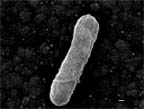The association of endophytic bacteria with their plant hosts has been shown to have a growth-promoting effect for many plant species. Endophytic bacteria have several mechanisms by which they can promote plant growth and health on marginal, polluted soils. These include the production of phytohormones or enzymes involved in growth regulator metabolism such as ethylene, 1-aminocyclopropane-1-carboxylic acid (ACC) deaminase, auxins, indoleacetic acid (IAA) or cytokinins. In addition, endophytic bacteria can help their host plants to overcome the phytotoxic effects caused by environmental contamination. When dealing with organic contaminants, the benefical effects of endophytes can be enhanced by equipping them with the appropriate degradation pathways that complement the metabolic properties of their host plant. The idea behind this concept was that it is much easier to engineer the metabolic properties of a microorganism than those of a plant. We demonstrated that endophytic bacteria equipped with the tom toluene degradation pathway can significantly improve the in planta degradation of BTEX and TCE in poplar, resulting in reduced phytotoxicity and release. Recent research by our group illustrates the potential of endophytic bacteria to increase the biomass production of poplar. Our goal is to identify endophytic bacteria that improve the growth and phytoremediation potential of poplar on marginal, contaminated soils. Serratia proteamaculans 568, which belongs to the family of the Enterobacteriaceae, was isolated as a root endophyte from Populus trichocarpa. S. proteamaculans has been found promote plant growth, and it has been hypothesized and demonstrated that this occurs via the production of specific compounds, such as lipo-chitin oligosaccharides, which are used as specific bacteria-to-plant signals. Individual plant growth promoting bacteria produce specific structurally diverse LCO mixtures, a topic that was recently reviewed. The sequencing of S. proteamaculans 568 genome will provide an ideal basis to study bacteria to plant signaling of this bacterium and its poplar host. Dr. Daniel van der Lelie, M.B.A. |
||
|
||
Serratia proteamaculans 568

